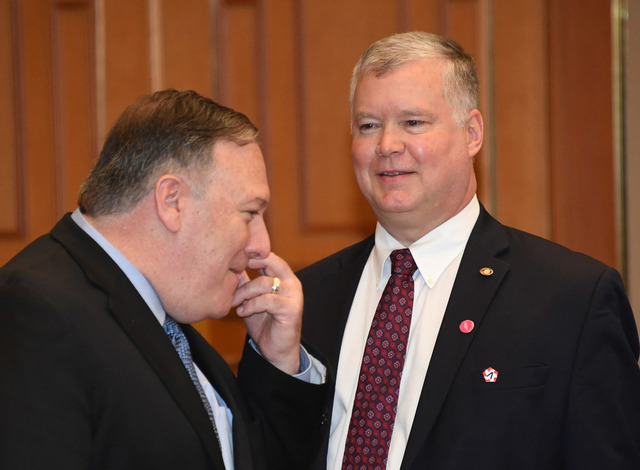Posted on : Aug.19,2019 17:50 KST
Modified on : Aug.19,2019 18:10 KST
 |
|
US Secretary of State Mike Pompeo and US Special Representative for North Korea at the Blue House on June 30. (Blue House photo pool)
|
South Korea and the US have jointly announced that US Special Representative for North Korea Stephen Biegun will visit South Korea from Aug. 20 to 22 after a brief stop-over in Japan. The trip was announced as military tensions have risen on the Korean Peninsula following a series of North Korean missile launches in protest to ongoing US-South Korea joint military exercises. Biegun’s trip to South Korea begins on the day these military drills are set to finish, which suggests that his trip may signal the restart of US-North Korean dialogue on denuclearization.
At face value, Biegun’s trip is aimed at strengthening cooperation between the US and South Korea in negotiations with North Korea over denuclearization. Experts, however, are focused on whether US and North Korea officials will make contact each other during Biegun’s trip. US President Donald Trump announced on Aug. 10 that North Korean leader Kim Jong-un had sent him a personal letter. The letter reportedly stated that Kim wanted to restart negotiations with the US as soon as US-South Korean military drills had concluded. US Secretary of State Mike Pompeo stated recently that North Korea’s missile tests have not impacted the fundamentals of the US’ approach toward North Korea and that the US is “planning for negotiations in a couple of weeks.” It appears clear that both the US and North Korea want to meet each other.
Initially, the US and North Korea agreed during the June 30 Panmunjom summit that working-level negotiations would begin in mid-July. Talks never got off the ground, however, because North Korea linked the US-South Korean joint military exercises with the start of the negotiations. Biegun will be staying in Japan for just one night and two days but is planning to be in South Korea for three days. Three days will allow him ample time to meet with North Korean officials in and around Panmunjom and discuss issues related to the denuclearization negotiations. If such contact between the two sides occurs during Biegun’s trip, denuclearization negotiations may pick up speed. However, both North Korea and the US are in a race against time. There are no more reasons to delay the restart of negotiations any longer.
North Korea’s missile launches and its harsh criticism of South Korean President Moon Jae-in’s Liberation Day address have dampened relations between the two Koreas. This only underlines the importance in getting US-North Korean negotiations back on track. It is difficult to imagine any progress in improving inter-Korean ties in the current atmosphere, and North Korea is clearly interested in improving relations with the US before making any effort to do the same with South Korea. The failure to restart US-North Korean negotiations will make it difficult for inter-Korean relations to improve. Only once US-North Korean negotiations get started will it become easier to remove the roadblocks that have stymied the inter-Korean relationship. Biegun’s trip to South Korea will hopefully alleviate the increased tensions on the Korean Peninsula and become a catalyst for the restart of US and North Korea denuclearization negotiations.
Please direct comments or questions to [english@hani.co.kr]






